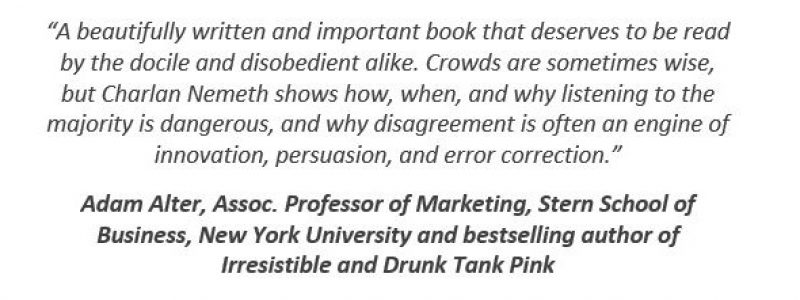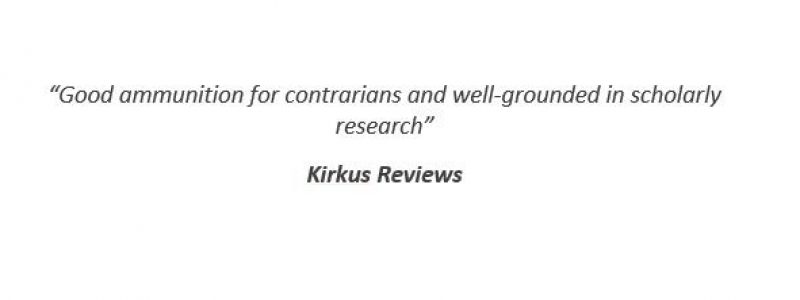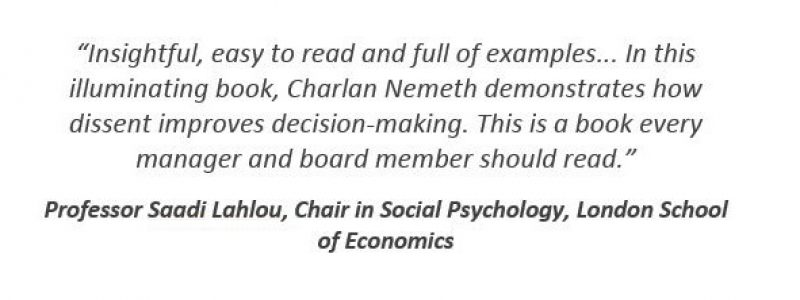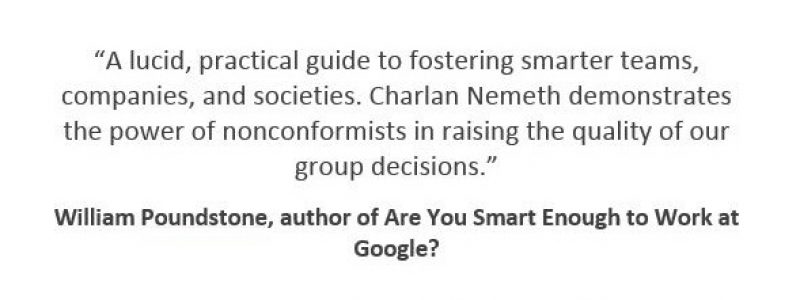This book is the culmination of decades of research by Dr. Nemeth on the power and value of dissent for the quality of decision-making and the creativity of solutions.

“In Defense of Troublemakers is an intelligent guide to embracing dissent in the decision-making process and a must read for people engaged in decision-making and progressive thinking”
“I especially like Charlan Nemeth’s work to refine the rules of brainstorming to allow for more creative and imaginative ideas”
Jennifer Johnson
President of Franklin Templeton Investments
Click here for a list of reviews of the book
Bad decisions are not a product of a lack of intelligence or knowledge. Nor are they fully understood by the usual “biases” in judgment and decision-making. They are strongly affected by social processes, by the opinions of others, and by predictable group processes. Those social processes do not just persuade us to a particular position. They change the way we think about the issue–often in ways of which we are unaware.
Good decision making requires divergent thinking, an unbiased search for information on all sides of the issue, a consideration of multiple alternatives, the weighing of the cons as well as the pros of any given position etc. Regardless of good intentions or even education and training, we don’t do this. We are subject to biases and most social processes conspire to narrow the range of considerations. Consensus and the seeking of it are culprits, not because we follow the consensus right or wrong, but because we think about the issue from that perspective.
By contrast, dissent opens the mind and actually stimulates divergent thinking. It not only challenges and breaks the hold of the majority, it stimulates the information search and consideration of alternatives; it widens the strategies used in problem solving and increases the originality of thought. This is true even when the dissenter is wrong. It is true even when we vigorously dislike the dissenter and her ideas.
The take-home of this book is two-fold. There are perils in consensus and there is value in dissent.
In this book, we learn that such narrow consensus driven thinking is not easily combatted by techniques such as the devil’s advocate which are role playing and, in fact, have some unintended negative consequences. It is authentic dissent, not a “pretend” version, that stimulates the kinds of divergent thinking that on balance leads to better decisions and more creative problem solving. A number of companies are starting to implement some of these concepts.
This book offers a counter to the assumption that liking and influence go hand, an assumption that can inadvertently foster inauthenticity or silence. These create problems in and of themselves but they also serve to permit problems to continue, such as fraud or civil rights violations.
Professor Nemeth’s research consistently demonstrates that dissent provides value in the kinds of thinking it stimulates and the quality of decisions that it serves. However, dissent is often viewed as an obstacle or something to be avoided– if not punished. It creates conflict and lowers morale. Thus, many people think its value lies in the possibility that it may be correct or some notion of it being appropriate for expression -though not for long. The importance of the major theme of this book is that dissent has value even when it is wrong and that its power rests on authenticity and respect .
Rather than promote consensus and punish dissent, most groups and organizations would profit from avoiding “cult-like” techniques that promote consensus and, instead, learning “to welcome and not to fear the voices of dissent” (Fulbright, 1964).




